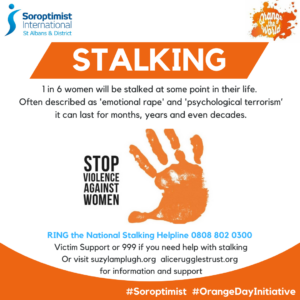On Monday 25th July it was lovely to be together at Greenwood URC for a “pot luck supper” where everyone brought a dish and a drink to share. A perfect way to mark the International Day of Friendship.
Sorry – no photo of the delicious spread – we forgot to take a pic when it was all beautifully displayed on the table so we’re standing in front of the mess of empty dishes! It was just a bit too chilly to be be outside so the picnic inside worked very well!
On a more serious note we are all wearing our new orange badges “Soroptimists say NO to Violence Against Women” – the 25th of every month is Orange Day – read below for more about “Orange Day” and the Soroptimist blog for July Orange Day on stalking.
Orange Day
The United Nations UNiTE campaign has proclaimed the 25th of each month as “Orange Day”, a day to raise awareness and take action to end violence against women and girls. As a bright and optimistic colour, orange represents a future free from violence against women and girls.
STALKING BLOG
What is stalking? It is a pattern of unwanted, fixated and obsessive behaviour which is intrusive and causes fear of violence, serious alarm or distress. These actions affect not only the person being stalked but also their extended network of family and friends. Stalking and harassment are crimes and must be treated as such.
Whilst stalking of well known individuals sometimes makes headlines the majority of cases occur during everyday life to everyday people. In addition to the ‘commonly known’ behaviours stalking also occurs when other actions happen such as:
- Making up things to damage your reputation
- Making false complaints to agencies
- Spreading harmful rumours about you
- Leaving or ordering unwanted materials or gifts for you
- Being bullied at work or school
- In extreme cases the stalker may threaten to kill themselves (emotional blackmail).
It is prevalent in society – between April 2019 and March 2020 an estimated 4% of people (just over 2.5 million) experienced stalking in the UK. However the number of cases recorded by the Police represents less than 1% of cases that take place. During this period the Suzy Lamplugh Trust estimates that only 0.10% of cases reported resulted in a conviction.
It is persistent – stalking is considered persistent if it continues beyond two weeks yet many victims suffer up to 100 incidents before talking to the Police.
It is damaging – Stalking can have serious, life-threatening consequences for victims and can escalate to violence regardless of the stalkers previous criminal history (if any). Serious psychological harm can be caused by stalking – victims often display signs of Post Traumatic Stress Disorder, anxiety and depression as well as issues with work which further adds to their distress and isolation. A study in 2009 (Mullen) reported that 75% of stalking victims reported feeling powerless whilst 25% reported seriously considering, or actually attempting suicide as a result of their experiences.
What to do if you are being stalked – You should report it to the Police giving as much information as possible, retain phone or text messages, try to get photographs if possible without putting yourself in danger.
Help is also available from the National Stalking Helpline (0808 802 0300) or from a variety of charities such as the Suzy Lamplugh Trust or the Alice Ruggles Trust. In addition you can find local assistance via the Victim and Witness Information page on the Ministry of Justice site (www.victimandwitnessinformation.org.uk)
Never write stalking off as ‘just one of those things”.


